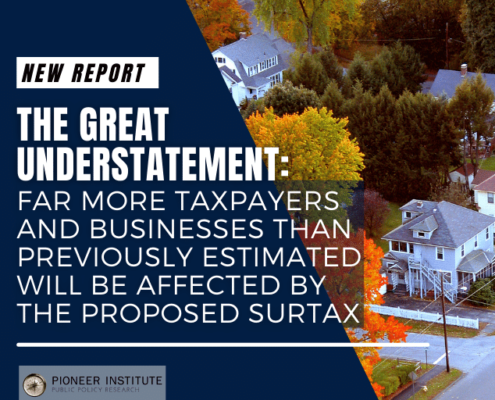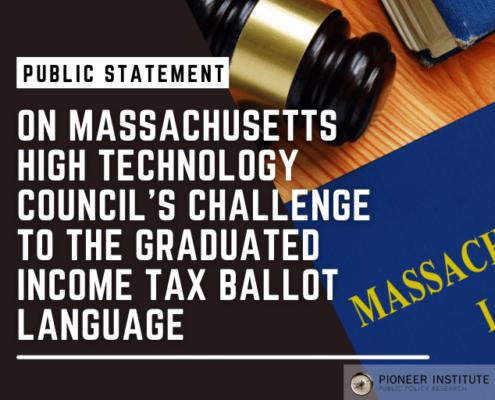
MBTAAnalysis: A look inside the MBTA
0 Comments
/
The MBTA shuttles over a million passengers a day around Greater…
 https://pioneerinstitute.org/wp-content/uploads/CloseupClock-1.jpg
739
1244
Mary Connaughton
https://pioneerinstitute.org/wp-content/uploads/logo_440x96.png
Mary Connaughton2017-02-20 12:34:192017-02-21 09:47:58The Clock is Ticking…….
https://pioneerinstitute.org/wp-content/uploads/CloseupClock-1.jpg
739
1244
Mary Connaughton
https://pioneerinstitute.org/wp-content/uploads/logo_440x96.png
Mary Connaughton2017-02-20 12:34:192017-02-21 09:47:58The Clock is Ticking…….
Pioneer Institute Statement on Question 1
Yesterday, voters came closer than many expected to rejecting the largest tax increase in Massachusetts history, even though opponents were dramatically outspent by the unions that bankrolled the amendment to the state Constitution.

Pioneer Institute Expects That Massachusetts Taxpayers Will Be Refunded $3.2B Due To State Revenue Cap
Pioneer Institute projects that the state will refund approximately $3.2 billion to taxpayers due to a state law sponsored by Citizens for Limited Taxation and voted on by taxpayers in 1986 that caps the amount of revenue the state can collect in any given year.

Survey of Business Sentiment: MA Income Tax Hike Would Lead to Employer Exodus
Nearly three quarters (73 percent) of Massachusetts business leaders think business associates will leave the state if a constitutional amendment appearing on the November ballot to hike taxes is successful, according to a survey conducted by Pioneer Institute.

As States Compete for Talent and Families, Massachusetts Experienced a Six-Fold Increase in Lost Wealth Compared to a Decade Earlier
With competition for businesses and talent heating up across the country, in 2020 Massachusetts shed taxpayers and wealth at a clip six times faster than even just a decade ago. Between 2010 to 2020, Massachusetts’ net loss of adjusted gross Income (AGI) to other states due to migration grew from $422 million to $2.6 billion, according to recently released IRS data now available on Pioneer Institute’s Massachusetts IRS Data Discovery website. Over 71 percent of the loss was to Florida and New Hampshire, both no income tax states.

Book Reveals How Tax Hike Amendment Would Damage Commonwealth’s Economic Competitiveness
If adopted, a constitutional amendment to hike state taxes that will appear on the ballot in November could erase the hard-earned progress Massachusetts has achieved toward economic competitiveness over the last 25 years and may not result in any additional education and transportation funding, according to a new book from Pioneer Institute, entitled Back to Taxachusetts?: How the proposed tax amendment would upend one of the nation’s best economies, which is a distillation of two dozen academic studies.

Study: Legislature Likely to Reduce Spending on Education and Transportation from Other Revenue Sources, Replace Cuts with Surtax Money
Revenue from a ballot initiative to amend the state Constitution and raise income taxes on households and businesses by adopting a graduated income tax structure would supposedly provide resources for transportation and public education, but a new study published by Pioneer Institute finds that, were the tax amendment to pass, the money would be fungible and much of it likely spent on general budget measures.

Pioneer Supports Legal Challenge to Misleading Tax Ballot Language, Releases Video
Pioneer Institute supports the diverse and bipartisan group that filed a complaint with the Massachusetts Supreme Judicial Court (SJC) challenging the summary language meant to provide an accurate description of the tax hike amendment to voters. The language was approved by the Attorney General and Secretary of the Commonwealth when a similar amendment was proposed in 2018, and unless the lawsuit is successful, will likely appear on the Massachusetts ballot in November.

Study: Tax Up For A Vote In November Would Ensnare Over Three Times More Taxpayers Than Previously Estimated
Analyses from the Massachusetts Department of Revenue (MADOR, 2016) and Tufts University’s Center for State Policy Analysis (2022) dramatically underestimated the number of households and businesses impacted by the constitutionally-imposed tax hike that the legislature is putting before voters in November 2022, according to a new study from Pioneer Institute.

Public Statement on Massachusetts High Technology Council’s Challenge to the Graduated Income Tax Ballot Language
The Massachusetts High Technology Council is right to insist on transparency in the language of a tax hike amendment scheduled to appear on the Massachusetts state ballot next year.

Study: “Millionaire’s Tax” Would Have Far-Reaching Effects on “Pass-Through” Businesses
A proposed graduated income tax that will appear on the statewide ballot in November 2022 will have much more far-reaching implications than most people realize because the surtax also extends to “pass-through” income from entities such as S and limited liability corporations, partnerships, and sole proprietorships that are taxed on individual tax returns, according to a new study published by Pioneer Institute.

Study Warns that New Hampshire Tax Policies Would Exacerbate Impacts of a Graduated Income Tax
Drawing on migration patterns between Massachusetts and states like Rhode Island and Tennessee, Pioneer Institute is releasing a study showing a direct correlation between personal income tax rates and household domestic migration patterns between 2004 and 2019. The study suggests that instituting a graduated income tax will shrink the tax base and deter talented workers and innovative employers from coming to and staying in the Bay State.

Study Finds SALT Deduction Cap, Graduated Income Tax Will Combine to More Than Double Tax Burden on Some Households
A provision of the federal Tax Cuts and Jobs Act of 2017 strictly limiting deductions for state and local taxes (SALT) will greatly exacerbate the adverse effects of a proposal to create a constitutionally mandated graduated income tax, according to a new study published by Pioneer Institute.

This Is No Time for a Tax Increase
This is no time to threaten Massachusetts’ prospects for an immediate economic recovery and the long-term competitiveness of the Commonwealth’s businesses. As Massachusetts lawmakers prepare to vote on whether to send a proposed constitutional amendment that would impose a 4 percent surtax on residents who earn $1 million or more in a year to the statewide ballot in 2022, Pioneer Institute urges them to recognize that tax policy sizably impacts business and job location decisions and that jobs are more mobile than ever.

Study Finds Deep Flaws in Advocates’ Claims that the Massachusetts Tax Code is Regressive
Proponents of a state constitutional amendment to add a 4 percent surtax on all households with annual income above $1 million frequently cite 2015 data from the Institute on Taxation and Economic Policy, which argues that the Massachusetts tax code is regressive, but a new study published by Pioneer Institute debunks many of the underlying assumptions used in ITEP’s 2015 report.

Study Says Interstate Tax Competition, Relocation Subsidies Exacerbate Telecommuting Trends
A spate of new incentive and subsidy programs seeking to lure talented workers and innovative businesses away from their home states could constitute an additional challenge to Massachusetts’ economic and fiscal recovery from COVID-19, according to a new study published by Pioneer Institute.

Study Warns Massachusetts Tax Proposal Would Deter Investment, Stifling the “Innovation Economy”
A state constitutional amendment promoted by the Massachusetts Teachers Association and the Service Employees International Union adding a 4 percent surtax to all annual income above $1 million could devastate innovative startups dependent on Boston’s financial services industry for funding, ultimately hampering the region’s recovery from the COVID-19 economic recession, according to a new study published by Pioneer Institute.

Study Shows the Adverse Effects of Graduated Income Tax Proposal on Small Businesses
The state constitutional amendment promoted by the Massachusetts Teachers Association and the Service Employees International Union to add a 4 percent surtax to all annual income above $1 million will adversely impact a significant number of pass-through businesses, ultimately slowing the Commonwealth’s economic recovery from COVID-19, according to a new study published by Pioneer Institute.

Study: Graduated Income Tax Proposal Fails to Protect Taxpayers from Bracket Creep
The state constitutional amendment proposed by the Service Employees International Union and the Massachusetts Teachers Association to add a 4 percent surtax to all annual income above $1 million purports to use cost-of-living-based bracket adjustments as a safeguard that will ensure only millionaires will pay. But historic income growth trends suggest that bracket creep will cause many non-millionaires to be subject to the surtax over time, according to a new study published by Pioneer Institute.

New Study Warns Graduated Income Tax Will Harm Many Massachusetts Retirees
If passed, a constitutional amendment to impose a graduated income tax would raid the retirement plans of Massachusetts residents by pushing their owners into higher tax brackets on the sales of homes and businesses, according to a new study published by Pioneer Institute. The study, entitled “The Graduated Income Tax Trap: A retirement tax on small business owners,” aims to help the public fully understand the impact of the proposed new tax.

Study: Graduated Income Tax Proponents Rely on Analyses That Exclude the Vast Majority Of “Millionaires” to Argue Their Case
Advocates for a state constitutional amendment that would apply a 4 percent surtax to households with annual earnings of more than $1 million rely heavily on the assumption that these proposed taxes will have little impact on the mobility of high earners. They cite analyses by Cornell University Associate Professor Cristobal Young, which exclude the vast majority of millionaires, according to a new study published by Pioneer Institute.

Report Contrasts State Government and Private Sector Employment Changes During Pandemic
Massachusetts state government employment has been virtually flat during COVID-19 even as employment in the state’s private sector workforce remains nearly 10 percent below pre-pandemic levels, according to a new study published by Pioneer Institute. The study, “Public vs. Private Employment in Massachusetts: A Tale of Two Pandemics,” questions whether it makes sense to shield public agencies from last year’s recession at the expense of taxpayers.

Study Finds Massachusetts Graduated Income Tax May Be a “Blank Check” and Not Increase Funding for Designated Priorities
Advocates claim a proposed 4 percent surtax on high earners will raise nearly $2 billion per year for education and transportation, but similar tax hikes in other states resulted in highly discretionary rather than targeted spending, according to a new policy brief published by Pioneer Institute. That same result or worse is possible in Massachusetts because during the 2019 constitutional convention state legislators rejected — not just one, but two — proposed amendments requiring that the new revenues be directed to these purposes.

Report: Proposed Graduated Income Tax Might Not Increase State Education and Transportation Spending
While supporters of a state constitutional amendment that would impose a 4 percent tax rate hike on annual income over $1 million claim additional revenue from the surtax will fund public education and transportation needs, the amendment in no way assures that there will be new spending on these priorities. In fact, without violating the amendment, total state education and transportation funding could stay the same or even fall, according to a new review published by Pioneer Institute.

New Study Highlights Economic Fallout from California’s 2012 Tax Hike
A 2012 income and sales tax increase in California, named “Proposition 30,” stifled business activity, accelerated out-migration among the wealthy, and ultimately reduced the state’s tax base, according to a new study published by Pioneer Institute that aims to share empirical data about the impact of tax policy decisions.

New Study Finds Pandemic-Spurred Technologies Lowered Barriers to Exit in High-Cost States
Both employers and households will find it easier to leave major job centers as technologies made commonplace by the COVID-19 pandemic have led to a rethinking of the geography of work, according to a new study published by Pioneer Institute.

New Study Shows Significant Wealth Migration from Massachusetts to Florida, New Hampshire
Over the last 25 years, Massachusetts has consistently lost taxable income, especially to Florida and New Hampshire, via out-migration of the wealthy, according to a new Pioneer Institute study.
In “Do The Wealthy Migrate Away From High-Tax States? A Comparison of Adjusted Gross Income Changes in Massachusetts and Florida,” Pioneer Institute Research Director Greg Sullivan and Research Assistant Andrew Mikula draw on IRS data showing aggregate migration flows by amount of adjusted gross income (AGI). The data show a persistent trend of wealth leaving high-tax states for low-tax ones, especially in the Sun Belt.

California Tax Experiment: Policy Makers Receive Valuable Economics Lesson
Host Joe Selvaggi talks with Stanford University Economics Professor Joshua Rauh about his research on the reaction of Californians to a tax increase, from his report, “The Behavioral Response to State Income Taxation of High Earners, Evidence from California.” Prof. Rauh shares how his research offers tax policy makers insight into the likely effects of similar increases in their own states, including here in Massachusetts.

New Study Finds Tax Policy Drives Connecticut’s Ongoing Fiscal & Economic Crisis
Multiple rounds of tax increases aimed at high earners and corporations triggered an exodus from Connecticut of large employers and wealthy individuals, according to a new study published by Pioneer Institute.

Study: Methodology of Noted “Millionaire’s Tax” Researcher Excludes Vast Majority of Millionaires
The work of a Stanford University Professor whose research has…

Inadequate Inflation Adjustment Factor Will Subject Increasing Numbers of People to So-Called “Millionaires” Tax
Would take particular toll on those relying on home value appreciation…
